Finances
Talking to Your Spouse About Finances
06/11/14 08:12 Filed in: Marriage

Start with You
When it comes to talking about money, it is important to have a handle on your own triggers, goals, and ideas on how to manage it. Before you talk to your spouse about money ask yourself: How do I feel about budgeting our money? What things do I typically spend money on that I could eliminate if need be? What are my goals for our money? Are those goals realistic? Or, are those goals built around my own agenda for what I want?
Consider Your Spouse
Once you have had a chance to wrestle down your own thoughts and feelings about money, it is important to begin to think about your spouse and how he/she views money. Does your spouse share your views on money? In what ways would my money habits cause my spouse anxiety? How good of a job do you do of communicating about money to each other? Where would my spouse say I mishandle our money? The more you understand where your spouse is coming from the better your conversation about money will be. Like other areas of your marriage, understanding your spouses perspective will go a long way to avoiding blow ups and conflict when it comes to discussing money.
Sit Down and Talk Together
Once you have both prepared yourselves by understanding your own views on money and what you think your spouses’ views are, set aside some time to talk about your finances together. Start with a word of prayer together to set the tone for your discussion. Invite the Lord into your conversation and pray for His wisdom on how you handle your finances. Then begin to talk about your finances together. As you discuss these things do the following:
1. This is not a business negotiation: Don’t treat your spouse as an opponent to out negotiate to get what you want. Instead, you need to see your spouse as a partner who has an equal share in what you do with your finances.
2. Come with what you will give up: Instead of defending your spending habits, each of you come with things you are willing to give or cut back for the sake of the budget. That will keep either of you from digging in and not compromising together.
3. Keep the good of the family in the long run ahead of what you might not get in the short run: This is about planning for your future together which means some sacrifice is inevitable.
4. Remember to honor your spouse in the conversation: This discussion is about your future together. Don’t belittle or dishonor your spouse in the process of having this conversation. If at any time you find that you are getting mad at each other or going to name calling, quit and come back to it later. If you feel you can’t over come your impasse, ask for help from a mentor couple or someone at your church. You never want money to become an issue that comes between you.
Talking about money can be difficult but it can also be a bonding experience if you are willing to hang in there and see it as an opportunity to get on the same page and have the same goals together. There will always be times where you will not agree 100% but how you handle those times of disagreement could help you grow closer together.
Comments
Guest Spot on ScreenCastsOnline
14/06/12 21:53 Filed in: Technology
This week I had the privilege of having one of my screencasts on MoneyWell shown on my favorite Mac tutorial site ScreenCastsOnline. Don McAllister who is the Host and Founder of the weekly screencasts was really one of the people who inspired me to do screencasts as a great way to educate people on how to use Apple Software. I started with my own YouTube Channel and started with screencasts for my family and friends and found others were interested in viewing the screencasts as well, especially the ones I have recently been doing on Lion Server. You can see my other screencasts at my YouTube Channel below or here on my site by clicking HERE.
If you haven’t checked out ScreenCastsOnline and you are an Apple Computer user I highly recommend checking Don’s tutorials out as they are very well done and a great way to learn new ways to use your Mac. Click the screenshot below to check out my guest spot and to get a feel for the great service Don has to offer. Thanks for using my screencast Don and making it look even better to boot!
MoneyWell 2.0: Event Based Budgeting
24/02/12 07:17 Filed in: Technology

In this tutorial I cover the changes from version 1.7 of MoneyWell to it’s 2.0 version. I also cover the basics of using this software to set up a budget using an event based system which makes it far more flexible than the old version and saves a lot of time manually calculating what goes into each bucket category. I like the new system and think you will as well.
Money Management with MoneyWell 2.0
18/02/12 08:04 Filed in: Technology

MoneyWell is not just a digital ledger for your finances, though it does that very well. It is also an envelope system at the same time. MoneyWell uses the analogy of buckets that you fill with money instead of envelopes. You set a budget based on your spending for different categories and MoneyWell lets you know how well you are doing against that budgeted amount. So you can actually see where your money is going instead of lamenting after the money is already gone. I have used this software for a few years now and I have really grown to love it.
Recently the developer of MoneyWell, Kevin Hoctor, put out a new update which changed the interface quite a bit. It really made it nicer to look at and updated it to the new Lion/iOS look and feel. Many people got upset and felt it was completely different and there was some uproar over at the Mac App Store about it. In and effort to show how the program is similar to old one and some of the things that have changed, I did this screencast. Hopefully it will help people to decide whether to upgrade or not. Personally, I like the new interface and some of the changes that were made. There are some things I would like to get back, but over all it has been a good upgrade for me.




